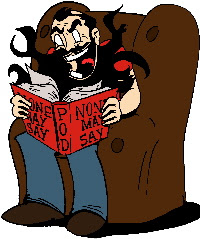 Poor Fenton Bland. His life at college is rapidly spiraling out of control. It's bad enough that he's stuck in the class of Professor Ivan Lego, whose theory of socioliterology -- the concept that any writing is wrongfully oppressive because "it owes its very existence to a foundational act of suppression, namely, the suppression of non-language" -- is taking the academic world by storm. It's even worse that he's inadvertently given Pamela, a student activist with whom Fenton shares a deep, dark shame, the idea to strike a blow for the disenfranchised by campaigning for the release of a notorious serial killer. Still worse, Fenton's relationship with his lesbian faux-vegetarian deadbeat housemates is worse than ever (not least because of the dead cat). But worst of all is that the student Maoist group that Fenton joined solely for the purpose of getting close to the beautiful Charmaine is singularly focused on announcing itself by assassinating someone, and Fenton is stuck right in the middle of the plot.
Poor Fenton Bland. His life at college is rapidly spiraling out of control. It's bad enough that he's stuck in the class of Professor Ivan Lego, whose theory of socioliterology -- the concept that any writing is wrongfully oppressive because "it owes its very existence to a foundational act of suppression, namely, the suppression of non-language" -- is taking the academic world by storm. It's even worse that he's inadvertently given Pamela, a student activist with whom Fenton shares a deep, dark shame, the idea to strike a blow for the disenfranchised by campaigning for the release of a notorious serial killer. Still worse, Fenton's relationship with his lesbian faux-vegetarian deadbeat housemates is worse than ever (not least because of the dead cat). But worst of all is that the student Maoist group that Fenton joined solely for the purpose of getting close to the beautiful Charmaine is singularly focused on announcing itself by assassinating someone, and Fenton is stuck right in the middle of the plot.
Don't worry if you don't have a good sense of what "Maoists" are. Neither do I. Nor, for that matter, do the members of the Maoist group. And that, in a nutshell, is what makes Mark Osher's delightful A Dancing Bear such a spot-on primer to the college experience. It's all there: the students whose big plans and grand statements are undermined by their own lack of understanding (and ability). The academics whose outré theories are driven by self-promotion rather than genuine relevance. The everyman stuck in the middle, trying to do what is right but restrained by his own passivity. And, of course, the university public bathrooms:
And the stench … the stench was the stench of the jungle. No man who smelled it could possibly retain any of those frayed illusions concerning the supremacy, or even the adequacy, of his gender. But the really alarming thing about this reek was this: it kept getting worse. Which could only mean one thing. People kept contributing to it. Somewhere on campus there existed men who were still prepared to use this facility – men who thought it a fit venue in which to bare the most intimate parts of their flesh. Who were they, these men? Chillingly, they had to be out there in the general population, blending in, walking past you every day without your knowing it. Maybe they were your friends, your tutors. The guy with the mysterious grin who ran the bakery. The shuffling first-year with the bad skin and the walkman. Elderly professors who wore sneakers with their slacks and accused your essays of being “prolix,” hardy old campaigners who probably took broadsheet newspapers in there and settled in for the long haul. The insane. The incontinent. Fugitives from justice. The damned.
A Dancing Bear is consistently hilarious, combining effective satire of academic, political and individual pomposity with regular moments of slapstick, laugh-out-loud humor. However, equally impressive is the novel's philosophical heart. For all of its worthwhile silliness, A Dancing Bear also is concerned with deeper questions that confront all collegians, and, for that matter, all thinking people. Can I steer my life where I want it to go? Or am I locked in to a path set by outside forces or simple inertia? What would it take to change my life? A Dancing Bear seamlessly works these weighty themes into its rollicking tale, ultimately proving satisfying on many levels.
All told, A Dancing Bear is a brilliant success and is highly recommended. It is available for free at the official website (which is very amusing in its own right), either as chapter-by-chapter webpages or as a printer-friendly RTF file of the complete novel. The novel is also available as a free downloadable audiobook. As the website notes, "the world is fast running out of excuses not to read this book."











